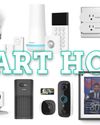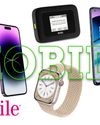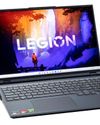يحاول ذهب - حر
Why Satellite Internet Is The New Space Race
September 2018
|PC Magazine
There’s a theory (or perhaps a cautionary tale) among astronomers called the Kessler Syndrome, named for the NASA astrophysicist who proposed it in 1978. In this scenario, an orbiting satellite or some other piece of material accidentally strikes another and breaks into pieces.

These pieces whirl around the Earth at tens of thousands of miles per hour, destroying everything in their path, including other satellites. It starts a catastrophic chain reaction that ends in a cloud of millions of pieces of nonfunctional space debris that orbits the planet indefinitely.
Such an event could make an orbital plane functionally useless, destroying any new satellites sent into it and possibly preventing access to other orbits and even all of space.
So when SpaceX filed a request with the FCC to send 4,425 satellites into lowEarth orbit (LEO) to provide a global high-speed internet network, the FCC was reasonably concerned. For more than a year, the company responded to questions from the commission and petitions by competitors to deny the application, including filing an “orbital debris mitigation plan” to allay fears of Kesslerian apocalypse. On March 28, the FCC granted SpaceX’s application.
Space junk is not the only thing the FCC is concerned about—and SpaceX isn’t the only entity trying to build the next generation of satellite constellations. A handful of companies, both new and old, are leveraging new technology, developing new business plans, and petitioning the FCC for access to the parts of the communications spectrum they need to blanket the Earth in fast, reliable internet connectivity.
Big names are involved—from Richard Branson to Elon Musk—along with big money. Branson’s OneWeb has raised $1.7 billion so far, and SpaceX president and COO Gwynne Shotwell estimated a $10 billion price tag for that company’s project.
هذه القصة من طبعة September 2018 من PC Magazine.
اشترك في Magzter GOLD للوصول إلى آلاف القصص المتميزة المنسقة، وأكثر من 9000 مجلة وصحيفة.
هل أنت مشترك بالفعل؟ تسجيل الدخول
المزيد من القصص من PC Magazine

PC Magazine
AUDIO
AUDIO
1 mins
December 2022

PC Magazine
SMART HOME
SMART HOME
3 mins
December 2022

PC Magazine
T Mobile
Mobile
2 mins
December 2022

PC Magazine
Lenovo Legion 5 Pro Gen 7 (2022): Nearly an Editors' Choice
A solid gaming laptop for under 2,000
6 mins
December 2022

PC Magazine
Apple TV 4K 3rd Generation): Best for the Apple-Centric
A powerful, feature-rich media streamer that’s pricier than most
7 mins
December 2022

PC Magazine
20 Tips for Leveling Up Your Work-at-Home Game
Whether you're new to working remotely or just looking fo do if beffer, fhese fips can help you stay productive and maintain balance.
13 mins
November 2022

PC Magazine
12 Google Calendar Tricks You're Probably Not Using
Wondering how to share your Google Calendar? Want to add a new calendar? Here are the tips you need.
6 mins
November 2022

PC Magazine
SimpliSafe Home Security System: Affordable Ease of Use
Affordable security with a focus on flexibility
11 mins
November 2022

PC Magazine
Honda Unveils First All-Electric SUV, Built on GM's Battery Platform
The Honda Prologue battery-electric SUV arrives in 2024 and will use the Ultium battery technology developed by General Motors.
2 mins
November 2022

PC Magazine
We Must Save Streaming Video Before It’s Too Late
A generation of art risks extinction if the companies that own streaming services don’t believe their vast libraries are worth preserving. We have to act now to save it.
5 mins
November 2022
Translate
Change font size
